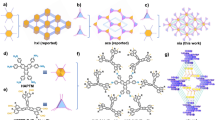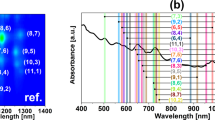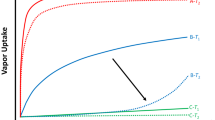Abstract
The use of ‘Bentone-34’ (dimethyldioctadecylammonium bentonite) for the separation of aromatic hydrocarbons has been described previously1–3, but the chromatograms published have either exhibited considerable tailing2 or, where symmetrical peaks have been shown, these have been obtained using small sample volumes (about 0.02 µl.) and ionization detectors3,4.
This is a preview of subscription content, access via your institution
Access options
Subscribe to this journal
Receive 51 print issues and online access
$199.00 per year
only $3.90 per issue
Buy this article
- Purchase on Springer Link
- Instant access to full article PDF
Prices may be subject to local taxes which are calculated during checkout
Similar content being viewed by others
References
White, D., Nature, 179, 1075 (1957).
Hughes, M. A., White, D., and Roberts, A. L., Nature, 184, 1796 (1959).
Van Rysselberge, J., and Van der Stricht, M., Nature, 193, 1282 (1962).
Cowan, C. T., and Hartwell, J. M., Nature, 190, 712 (1961).
Author information
Authors and Affiliations
Rights and permissions
About this article
Cite this article
MORTIMER, J., GENT, P. Use of Modified ‘Bentone-34’ for the Gas Chromatographic Separation of Aromatic Hydrocarbons. Nature 197, 789–790 (1963). https://doi.org/10.1038/197789a0
Issue Date:
DOI: https://doi.org/10.1038/197789a0
This article is cited by
-
Evaluation of new organoclay stationary phases for the separation of ethylbenzene and xylene isomers
Chromatographia (1991)
-
Colloid stationary phases containing aerosil
Chromatographia (1977)
-
Analysis of bromo-chlorobenzenes by gas chromatography
Chromatographia (1971)
-
Gas Chromatographic Separation of Stereoisomeric Trichloroheptanes using Organo-clay Complexes
Nature (1965)
-
Verwendung von Bentone-haltigen Trenns�ulen f�r die Graschromatographie von Polyphenylgemischen
Fresenius' Zeitschrift f�r Analytische Chemie (1964)
Comments
By submitting a comment you agree to abide by our Terms and Community Guidelines. If you find something abusive or that does not comply with our terms or guidelines please flag it as inappropriate.



